Asia migrants: What do those in the region think should be done?
- Published
Mariko Oi, Phil Mercer and Jonah Fisher examine how ordinary people in Malaysia, Australia and Myanmar are reacting to the migration crisis
Malaysia and Indonesia will soon be dealing with an influx of migrants, as search and rescue operations get under way.
About 7,000 migrants - Rohingya and Bangladeshi Muslims - are stranded in the Andaman Sea. Governments in the region were unwilling to bring them ashore until now, afraid of encouraging more to arrive at a later date.
Under international pressure Malaysia and Indonesia have agreed to give them temporary shelter. The US and others have offered to help resettle the migrants.
But how do ordinary people in countries around the region see the Rohingya, and the current crisis? BBC correspondents have been finding out.

Malaysia: 'The persecution of Rohingya should be stopped'
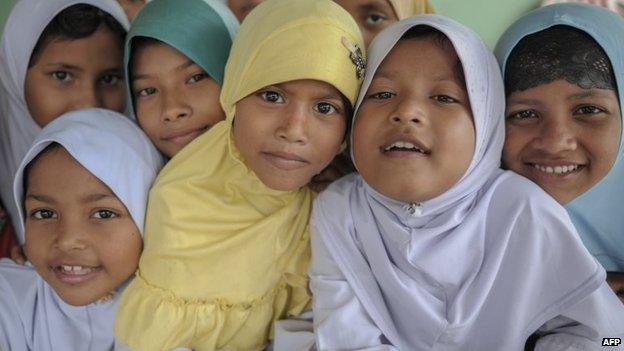
Malaysia is already home to 45,000 Rohingya migrants
After seeing the suffering of the migrants who had been stranded at sea, the majority in Malaysia feel it was the right decision to offer them temporary shelter.
One local newspaper, The Malaysia Star says: "We've accepted refugees from Bosnia and Vietnam, why not Rohingya?"
But there is also fear that this decision will open the floodgates to more migrants in the future.
Malaysia has long been the preferred destination for many of the Rohingya as the country is predominantly Muslim. It has already accepted about 45,000 of them over the years.
On Twitter, some expressed disappointment that their minister did not urge Myanmar, also known as Burma, to end the persecution of the minority group.
Mariko Oi, BBC News, Kuala Lumpur

Australia: 'We will not resettle any migrants'
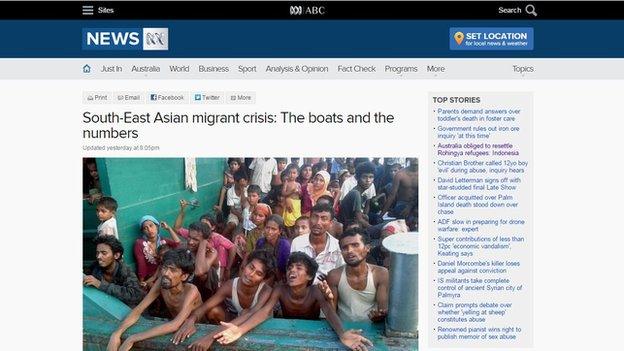
The desperate situation of the migrants has been widely covered in Australian media
Distressing images of emaciated and desperate Rohingya on boats have brought Myanmar's crisis to Australia's newspapers and TV news bulletins.
But Prime Minister Tony Abbott is not swayed, and says Australia will not resettle any of those who have fled. He said if it did, it would only encourage more waves of migrants.
"If we do the slightest thing to encourage people to get on boats this problem will get worse, not better," Mr Abbott said emphatically.
Since a comprehensive election victory in September 2013, the Abbott government has been using the navy to turn or tow asylum seeker boats away from Australian waters. What was a steady flow of unauthorised arrivals is now barely a trickle.
Critics, though, have accused the Prime Minister of being callous.
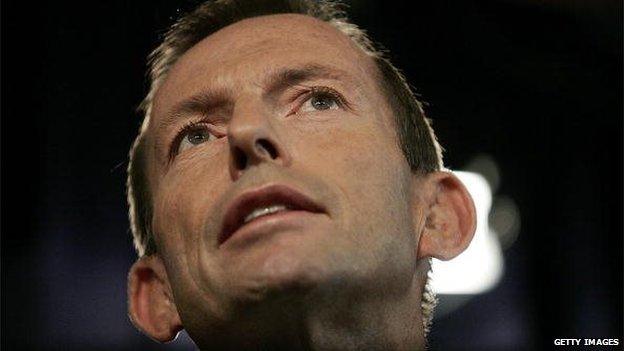
Prime Minister Tony Abbott is being urged to take in refugees by various groups
Chris Breen from the Refugee Action Collective in Melbourne said: "As the richest country in the region, Australia should offer to help Malaysia and Indonesia with permanent resettlement of stateless Rohingya refugees in Australia, to deal with the ongoing crisis. Now is a time for urgent humanitarian assistance, not cruelty".
The Australian Greens have urged Mr Abbott to authorise an emergency intake of refugees fleeing war and persecution in Myanmar, as previous governments did in the aftermath of the Vietnam War and Tiananmen Square massacre.
Phil Mercer, BBC News, Sydney

Indonesia: 'We should help, but Rohingya should go home afterwards'
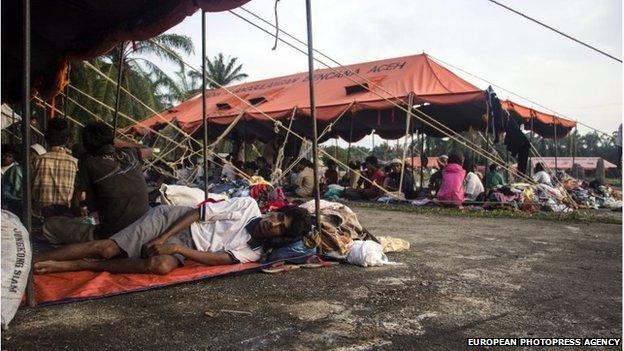
The Acehnese have been helping to provide food and shelter for the migrants landing there
Religion is playing the biggest part in sentiment towards migrants, especially Rohingya Muslims from Myanmar.
Muslims in Indonesia tend to show solidarity toward Rohingya, who they viewed as fellow Muslims being persecuted by the majority Buddhists in Myanmar.
From that point of view, many Indonesians urged the government to accommodate migrants in Aceh province.
However, there is also a growing opinion that the government should push Myanmar to take the migrants back.
They believed Indonesia, which has millions of poor and uneducated people, should be concerned with domestic issues and taking care of its own people.
Jerome Wirawan, BBC Indonesian Service, Jakarta

Bangladesh: 'The international community needs to step in'
'I was at sea for three weeks'
Poverty and unemployment is driving Bangladeshis to risk entering Malaysia by the illegal route, leaving from Cox's Bazar - or "Gateway to Malaysia" as it is known.
In 2012, Bangladesh and Malaysia signed a memorandum of understanding to allow for the legal migration of workers.
Some 1.5 million Bangladeshis registered their interest but little has happened since so they've been drawn into the hands of people traffickers.
In newspapers and on social media, there is sympathy for the Rohingya Muslims who are also making the journey.
They call on the international community to pressure Myanmar to protect them.

Nobody knows how many Rohingya from Myanmar now live in Bangladesh. The government estimates that it is hosting 400,000-500,000 people.
The government also says that Bangladesh is one of the world's most densely populated countries, home to 160 million people.
Everybody acknowledges that the government cannot find enough jobs for its own citizens, so how can it also look after the stateless Rohingya?
Akbar Hossain, BBC Bengali service, Cox's Bazar

Myanmar: No sympathy for the Rohingya 'problem'
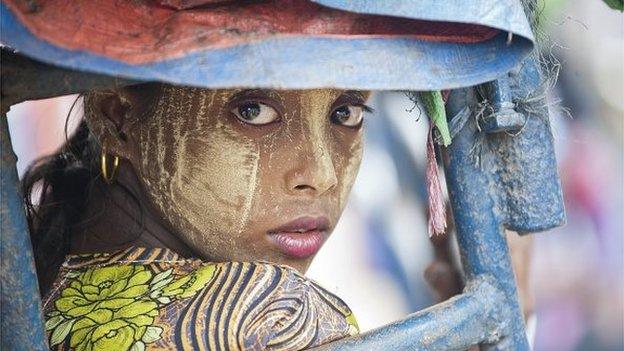
Ethnic Rohingya Muslims living in Myanmar are denied citizenship
The loudest voices in Myanmar are virulently anti-Rohingya. High-profile monks and senior politicians are showing little sympathy for people that many see as illegal immigrants from neighbouring Bangladesh.
On social media Burmese journalists covering the Rohingya story have been abused, and stories on the BBC Burmese Facebook page have attracted long lines of racist comment.
At times many seemed in favour of human trafficking, as a solution to the Rohingya "problem".
Quite how broadly that reflects Burmese public opinion is hard to say. Some moderate voices have called for compassion, and of course the vast majority of this country have no access to the internet or the mass media.
There has been the expected clamour, mostly from abroad, for opposition leader Aung San Suu Kyi to speak out.
Predictably, she has so far refused to get involved. There is an election here in early November, and not many votes are going to be won by standing up for a disenfranchised minority.
Jonah Fisher, BBC News, Yangon